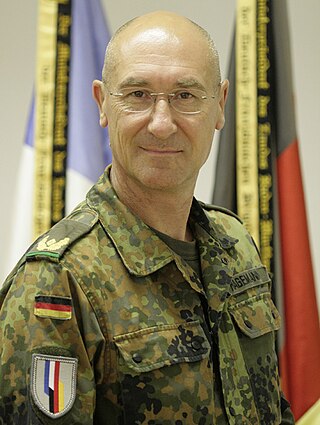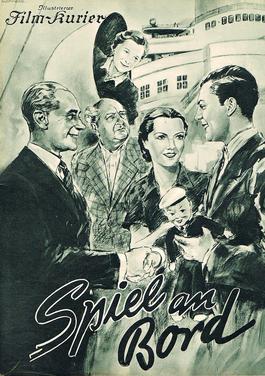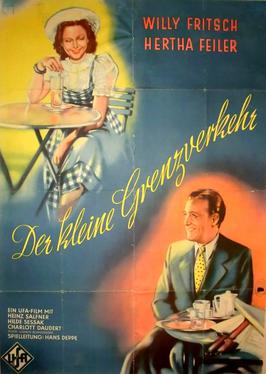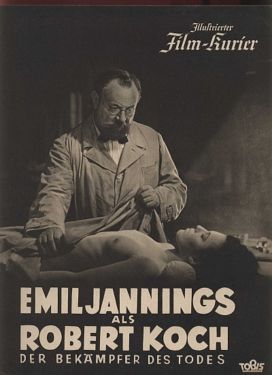
Ferdinand Lassalle was a Prussian-German jurist, philosopher, socialist and politician who is best remembered as the initiator of the social-democratic movement in Germany. "Lassalle was the first man in Germany, the first in Europe, who succeeded in organising a party of socialist action", according to Élie Halévy. Or, as Rosa Luxemburg put it: "Lassalle managed to wrestle from history in two years of flaming agitation that needed decades to come about".

Jean Baptista von Schweitzer was a German politician and dramatic poet and playwright.
The General German Workers' Association was a German political party founded on 23 May 1863 in Leipzig, Kingdom of Saxony by Ferdinand Lassalle. It was the first organized mass working-class party in European history.
Ernst Fritz Fürbringer was a German film actor. He appeared in 130 films between 1933 and 1983. He was born in Brunswick, Germany and died in Munich, Germany.

General of the Infantry is a former rank of the German army. It is currently an appointment or position given to an OF-8 rank officer, who is responsible for particular affairs of training and equipment of the Bundeswehr infantry.
Der Herr im Haus is a 1940 German film directed by Heinz Helbig.

Game on Board is a 1936 German comedy crime film directed by Herbert Selpin and starring Viktor de Kowa, Susi Lanner and Alfred Abel. Location shooting took place in Bremerhaven and New York and on the Atlantic crossing of the ocean liner SS Bremen. Interior scenes were shot at the Tempelhof Studios in Berlin. The film's sets were designed by the art director Erich Czerwonski.
Vengeance Is Mine is a 1916 German silent crime film directed by Rudolf Meinert and starring Hans Mierendorff, Herr Forstner and Marie von Buelow. It was part of a popular series of films featuring the fictional detective Harry Higgs. It was the first screenplay written by Ewald André Dupont, who later went on to be a leading filmmaker.

The Eleven Schill Officers is a 1932 German historical film directed by Rudolf Meinert and starring Friedrich Kayßler, Hertha Thiele, and Heinz Klingenberg. It was a remake of a 1926 silent film of the same name which had also been directed by Meinert. The film depicts the failed 1809 uprising of Prussian soldiers led by Ferdinand von Schill against the occupying French. It focuses in particular on eleven of Schill's officers who were executed by the French at Wesel. The film was a Prussian film, part of a wider trend of German historical films made during the Weimar Era and set in the Napoleonic Era.

The Woman at the Crossroads is a 1938 German drama film directed by Josef von Báky and starring Ewald Balser, Magda Schneider and Karin Hardt. It was made partly at the Hunnia Film Studios in Budapest. The film's sets were designed by the art director Emil Hasler.

A Salzburg Comedy or Little Border Traffic is a 1943 German comedy film directed by Hans Deppe and starring Willy Fritsch, Hertha Feiler and Heinz Salfner. Erich Kästner wrote the screenplay based on one of his own novels. As he had been blacklisted by the Nazi Party he used the pseudonym Berhold Bürger. The novel was again adapted for the 1957 film Salzburg Stories.

Robert Koch is a 1939 Nazi propaganda film directed by Hans Steinhoff and starring Emil Jannings, Werner Krauss and Viktoria von Ballasko. The film was a biopic of the German pioneering microbiologist Robert Koch (1843–1910). It was shot at the Johannisthal Studios in Berlin and premiered at the city's Ufa-Palast am Zoo. The film was made by the Tobis Film company, and was also distributed in the United States by the largest German studio UFA.

By a Silken Thread is a 1938 German drama film directed by Robert A. Stemmle and starring Willy Fritsch, Carl Kuhlmann and Käthe von Nagy. The film was intended to be an exposure of "crooked Jewish capitalists" in line with Nazi racial policy of the era. It was shot at the Babelsberg Studios of UFA in Potsdam. The film's sets were designed by the art director Otto Hunte.

When Women Keep Silent is a 1937 German comedy film directed by Fritz Kirchhoff and starring Johannes Heesters, Hansi Knoteck and Friedrich Kramer. A newly married couple become involved in a series of marital differences, largely due to misunderstandings.

The Spendthrift is a 1953 Austrian historical musical film directed by Leopold Hainisch and starring Attila Hörbiger, Josef Meinrad and Maria Andergast. It is an adaptation of Ferdinand Raimund's play of the same name.
Hunted Men is a German silent film made in 1924 and directed by Erich Schönfelder and starring Lucy Doraine, Johannes Riemann and Hans Albers.

One Night Apart is a 1950 West German period comedy film directed by Hans Deppe and starring Kurt Seifert, Olga Chekhova and Sonja Ziemann. It was shot at the Tempelhof Studios in Berlin. The film's sets were designed by the art director Gabriel Pellon.

Her Other Self is a 1941 German drama film directed by Wolfgang Liebeneiner and starring Hilde Krahl, Mathias Wieman, and Erich Ponto.

The Girl from Acker Street is a 1920 German silent drama film directed by Reinhold Schünzel and starring Otto Gebühr, Lilly Flohr, and Rosa Valetti. It was followed by two sequels directed by Werner Funck and Martin Hartwig respectively.

The Valley of Love is a 1935 German comedy film directed by Hans Steinhoff and starring Käthe Gold, Richard Romanowsky and Marieluise Claudius. It was shot at the Johannisthal Studios of Tobis Film in Berlin. The film's sets were designed by the art director Franz Schroedter. It is based on the 1902 farce Das Tal des Lebens by Max Dreyer. It was given a fresh release in 1950 by Deutsche London Film.















